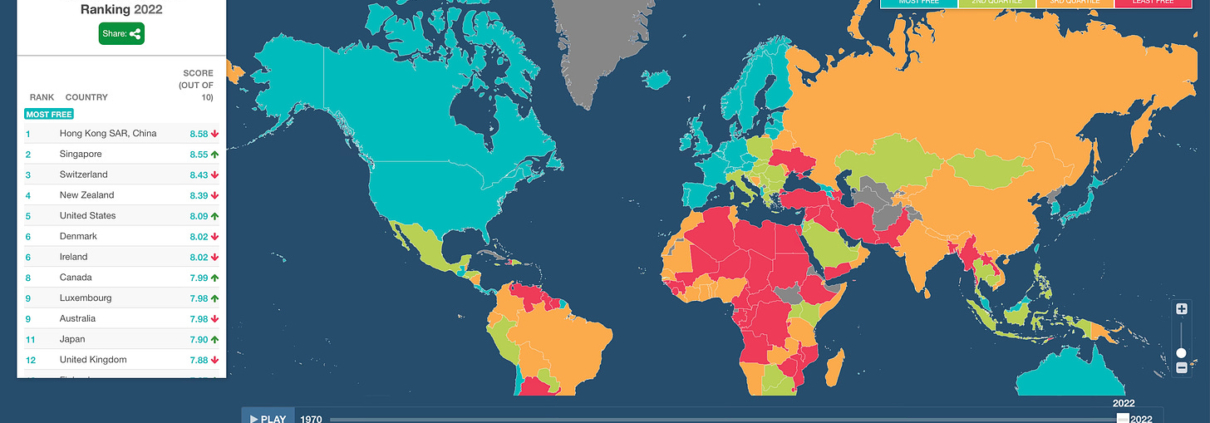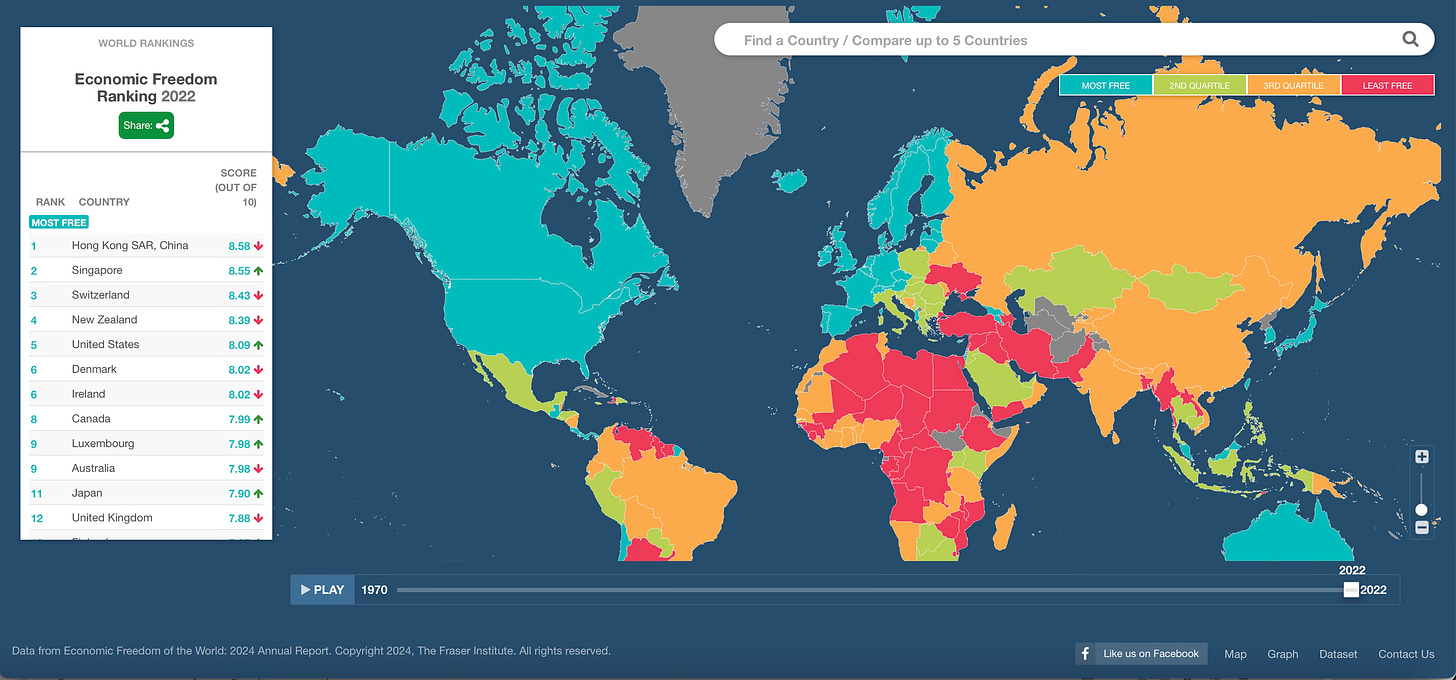How freedom brings economic prosperity at every level: macro, micro and nano.
The Fraser Institute, a Canadian think tank, has long championed the connection between economic freedom and prosperity for countries. Their annual Economic Freedom of the World Report analyzes data from over 160 countries to rank nations based on key indicators like government size, legal system integrity, property rights, freedom to trade internationally, and regulatory efficiency. The findings are clear: nations that prioritize economic freedom tend to experience higher levels of GDP growth, greater income equality, and improved quality of life.
Copyright 2024 The Fraser Institute
Economic freedom, as defined by the Fraser Institute, means individuals and businesses have the ability to make their own choices—what to produce, consume, and trade—within a framework of stable property rights, low taxes, and minimal government intervention. This environment fosters innovation, incentivizes investment, and allows for efficient allocation of resources. When entrepreneurs and firms face fewer barriers, they can respond to market demands and capitalize on opportunities, creating jobs and driving economic growth.
Empirical evidence supports this theory. Countries ranked in the top quartile of economic freedom, such as Singapore and Switzerland, consistently outperform those in the bottom quartile in terms of GDP per capita, poverty reduction, and life expectancy. For example, the Fraser Institute reports that the average income of the poorest 10% in the most economically free countries is significantly higher than the overall income in the least free countries. This suggests that economic freedom benefits all segments of society, not just the wealthy. The Fraser Institute’s data highlights that a baseline level of freedom is essential for sustainable prosperity, creating an environment where people and businesses can thrive.
Freedom in Firms: A Catalyst for Economic Thriving
At the level of the firm, the connection between freedom and economic performance has been increasingly recognized by business thinkers like Doug Kirkpatrick and others. They argue that giving employees greater autonomy—freedom to make decisions, experiment, and innovate—leads to stronger collaboration, faster problem-solving, and ultimately, better business outcomes. In other words, increasing freedom by loosening the grip of bureaucracy and rigid hierarchies can unleash a firm’s full potential.
Firms that embrace employee freedom often operate on principles of trust and self-management. For example, companies like W.L. Gore, the makers of GORE-TEX, and Brazil’s Semco have long rejected traditional command-and-control structures in favor of decentralized decision-making and collaborative cultures. Employees in these environments are encouraged to act as entrepreneurs, take ownership of their work, and coordinate directly with colleagues to achieve shared goals.
The results speak for themselves. Research shows that firms with higher levels of employee autonomy experience stronger engagement, reduced turnover, and more robust innovation pipelines. Employees given the freedom to think creatively and take calculated risks are more likely to generate ideas that drive revenue growth or cut costs. A Harvard Business Review study on self-managed teams found that such approaches also improve agility, enabling firms to respond to market changes more quickly.
Freedom within firms doesn’t mean chaos. These organizations typically replace rigid rules with clear principles and shared values, providing just enough structure to align efforts while avoiding micromanagement. This balance allows firms to maintain focus while encouraging adaptability and creativity.
Shared values are key to this level of effective implementation, where organizational freedom fosters innovation, strengthens employee morale, and positions the firm for sustained economic success in a rapidly changing world.
Individual Freedom and Peak Performance
At the individual level, freedom is the key to unlocking human potential, creativity, and fulfillment. Psychologists and thinkers like Mihaly Csikszentmihalyi and Daniel Pink have highlighted how autonomy enables people to perform at their best, not just for personal satisfaction but also as valuable contributors to broader progress and improvement.
Csikszentmihalyi’s concept of flow illustrates how freedom allows individuals to reach a state of optimal engagement. Flow occurs when a person tackles a challenging yet achievable task, fully immersing themselves in the process. This state of deep concentration and creativity not only leads to exceptional performance but is also profoundly fulfilling. Freedom is central to this: individuals must have the autonomy to select tasks that match their skills, set their own pace, and solve problems creatively. Constraints like micromanagement or rigid procedures disrupt flow and diminish both productivity and satisfaction.
Daniel Pink extends this idea by showing how autonomy, mastery, and purpose are the driving forces behind individual motivation. People are most engaged when they have the freedom to work on tasks that matter to them, develop and refine their skills, and contribute to something larger than themselves. This sense of agency transforms work from a mere obligation into a source of meaning, encouraging innovation and continuous improvement.
The evidence backs this up. Studies reveal that individuals with greater job autonomy report higher satisfaction, creativity, and performance. Autonomy also fosters resilience, enabling people to adapt to challenges and learn from failure, a critical trait in today’s fast-changing economy.
In essence, freedom doesn’t just enable individuals to perform better—it empowers them to grow, innovate, and find fulfillment. By creating environments where people can exercise autonomy, whether in firms or society at large, we unlock their capacity to contribute to economic and social progress in ways that rules and rigidity never can.
Freedom and flow in Kinetic Flow State Organizations (KFSOs).
There is a movement toward a new framework for business organization that recognizes and embraces the power of freedom. In his book Freedom and Evolution, Professor Adrian Bejan explains how all the evolving designs in nature – trees, river systems, animals – improve over time because they are free to flow: to discover, through change and experimentation, the best way to utilize their energy and thrive. The KFSO (Kinetic Flow State Organization) follows this law. Kinetic refers to the freedom to move, to always be moving, to be dynamic in principle and practice. Flow state refers to the combined flow of actionable knowledge through the organization to every individual and team, and the flow that those individuals experience when immersed in the task of applying that knowledge for value creation, where they all share purpose and each find personal meaning.
The business world is just beginning to understand the value-creation power of freedom, and to regret the century during which command-and-control management repressed that freedom at the cost of reduced productivity, growth and economic well-being. Exciting times are ahead.

